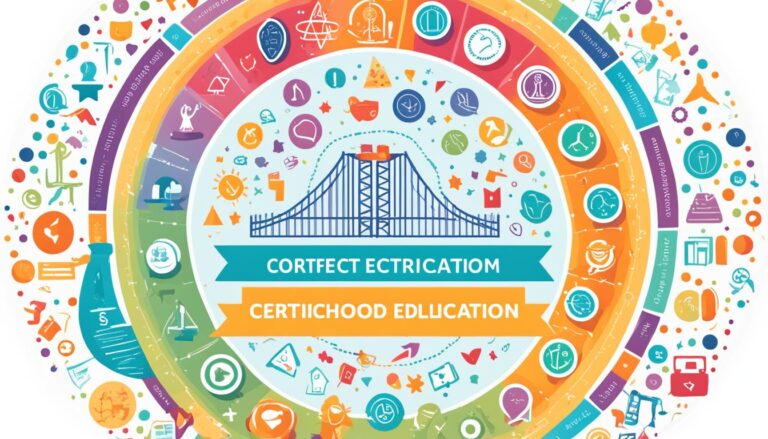Guiding Children Through Academic Challenges: Parental Tips
As a parent, I understand the importance of providing guidance and support to our children as they face academic challenges. It is our responsibility to help them navigate through these difficulties and ensure their educational success. In this article, I will share valuable tips and insights that can assist you in guiding your children through these academic challenges.
Academic challenges can manifest in various ways, such as struggling with certain subjects, managing time effectively, or feeling overwhelmed by the workload. By implementing effective strategies, we can empower our children to overcome these obstacles and thrive academically.
Communication plays a crucial role in guiding children through academic challenges. By maintaining an open and honest line of communication with our children, we can better understand their needs, concerns, and struggles. This allows us to provide the necessary support and encouragement. Regularly checking in with your child, actively listening, and creating a safe space where they feel comfortable expressing their academic challenges can make a significant difference.
Creating a structured routine is essential for guiding children through academic challenges. Help your child create a schedule that allows for dedicated time to complete homework, study, and relax. Teach them effective time management skills and the importance of prioritization. Encouraging consistent study habits and setting realistic goals can help them stay organized and focused.
Academic challenges can often lead to feelings of frustration, stress, and self-doubt in children. It is crucial to provide them with emotional support during these times. Offering words of encouragement, celebrating their achievements, and reminding them of their abilities can boost their self-confidence. Fostering a positive mindset and helping them develop resilience in the face of challenges is key.
Collaborating with educators is essential in guiding children through academic challenges. Maintaining open lines of communication with your child’s teachers and staying involved in their academic progress can ensure a holistic approach to their education. Seek their guidance and insights on how to best support your child’s specific needs. Additionally, be proactive in seeking out additional resources such as tutoring services, online educational platforms, or mentoring programs to supplement your child’s learning experience.
Celebrate the journey with your child and emphasize the growth they have achieved, both academically and personally. Remember, every child is unique and may experience academic challenges differently. By providing guidance, support, and a nurturing environment, we can empower our children to overcome these challenges and achieve their full potential.
Key Takeaways:
- Open and honest communication is crucial in guiding children through academic challenges.
- A structured routine can help children manage their time effectively and stay organized.
- Providing emotional support and fostering a positive mindset is essential during academic challenges.
- Collaborating with educators and seeking additional resources can enhance your child’s learning experience.
- Celebrate your child’s achievements and emphasize their growth throughout their academic journey.
Understanding the Importance of Communication
Communication is a fundamental aspect of guiding children through academic challenges. As a parent, it is crucial to maintain an open and honest line of communication with our children to better understand their needs, concerns, and struggles. By actively engaging in conversations, we can provide the necessary support and encouragement they require to overcome academic obstacles.
Regularly checking in with your child and actively listening to their thoughts and feelings can create a safe space where they feel comfortable expressing their academic challenges. This open channel of communication fosters a strong parent-child relationship, allowing us to address any issues promptly and effectively.
“Communication is the lifeline that connects parents and children, enabling them to navigate through academic challenges together.”
By discussing subjects such as schoolwork, assignments, and upcoming examinations, parents can gain valuable insights into their child’s academic journey. Encouraging open dialogue also helps parents identify potential areas of improvement and areas where additional assistance may be needed.
Active Listening: Nurturing Trust and Empathy
Active listening plays a vital role in effective communication. It involves not only hearing but also understanding and responding to our child’s concerns and emotions. When practicing active listening, give your undivided attention, maintain eye contact, and show empathy towards their experiences. Creating a safe environment where they feel heard helps strengthen the parent-child bond and establishes trust.
Encourage your child to share their academic challenges and experiences without judgment. Validate their emotions and reassure them that it is normal to encounter difficulties along their educational journey. By actively listening, we demonstrate that their thoughts and feelings are important, which can boost their self-esteem and motivation to overcome academic challenges.
The Power of Open Communication: A Supportive Network
In addition to fostering communication between parents and children, it is essential to promote open communication within the family unit. Encourage siblings to share their academic experiences and provide assistance and guidance when needed. This collaborative approach strengthens the support system and reinforces the idea that academic challenges are not faced alone, but as a united front.
Moreover, effective communication extends beyond the parent-child relationship. Collaborating with educators and actively participating in parent-teacher conferences allows us to gain insights into our child’s progress, strengths, and areas of improvement. By forming a strong partnership with educators, we can work together to create tailored strategies and support systems that meet our child’s specific academic needs.
Remember, effective communication serves as the foundation for guiding children through academic challenges. By maintaining open and honest lines of communication, we build trust, empathy, and a strong support system that empowers our children to overcome obstacles and achieve academic success.
| Benefits of Effective Communication | Ways to Improve Communication |
|---|---|
| 1. Enhanced parent-child relationship 2. Improved understanding of child’s needs 3. Prompt identification and resolution of challenges | 1. Active listening 2. Regular check-ins and conversations 3. Validation of child’s emotions 4. Collaboration with educators |
Creating a Structured Routine
Establishing a structured routine is vital for guiding children through academic challenges.
As a parent, I understand the importance of helping your child create a schedule that allows for dedicated time to complete homework, study, and relax.
Teaching your child effective time management skills and the importance of prioritization will equip them with valuable tools for success.
Encouraging consistent study habits will instill discipline and help them stay organized and focused.
Setting realistic goals together will provide your child with a sense of direction and accomplishment.
By following a routine, your child will develop a sense of stability and responsibility, enabling them to tackle academic challenges with confidence.
Benefits of a Structured Routine
A structured routine offers numerous benefits for your child’s academic journey.
- Enhanced Time Management: A well-structured routine helps your child allocate time effectively, ensuring they have enough time for studying while also allowing for relaxation and extracurricular activities.
- Improved Focus: By incorporating regular study sessions into their routine, your child can develop better concentration and focus, leading to increased productivity.
- Reduced Procrastination: Following a routine helps combat procrastination as it encourages your child to tackle tasks promptly and consistently.
- Increased Efficiency: With a structured routine, your child can develop efficient study habits, utilizing their time and resources optimally.
“A routine is not meant to be confining; it is a guide that helps children prioritize their responsibilities and manage their time effectively.” – Dr. Amanda Johnson, Child Psychologist
By creating a structured routine, you are providing your child with a solid foundation for academic success and personal growth.
Providing Emotional Support
Academic challenges can often lead to feelings of frustration, stress, and self-doubt in children. It is crucial to provide them with emotional support during these times. Offering words of encouragement, celebrating their achievements, and reminding them of their abilities can make a significant impact on their self-confidence and overall well-being.
As parents, we play a vital role in fostering a positive mindset and helping our children develop resilience in the face of challenges. By focusing on their strengths and providing unconditional support, we create an environment that empowers them to overcome obstacles and grow both academically and personally.
“When children feel emotionally supported, they are more likely to believe in their abilities and have the confidence to tackle even the most difficult academic tasks.”
We can offer emotional support in various ways:
- Active listening: Take the time to listen actively to your child’s concerns and frustrations. Often, they just need someone to lend an empathetic ear and validate their emotions.
- Empathy: Show understanding and empathy towards your child’s struggles. Let them know that it’s okay to face challenges and that their feelings are valid.
- Encouragement: Regularly provide words of encouragement and praise for their efforts, even if the outcomes may not always meet their expectations. Remind them that their hard work and perseverance matter more than the immediate results.
- Building a support system: Encourage your child to seek support from teachers, mentors, or friends who can provide guidance and encouragement. Having a strong support system can alleviate feelings of isolation and provide additional perspectives and insights.

“Emotional support empowers children to believe in themselves and their abilities, enabling them to face academic challenges with confidence.”
Remember, providing emotional support is an ongoing process. By consistently demonstrating our belief in our children and their potential, we create a foundation of self-confidence and resilience that will serve them well throughout their academic journey.
Example of Emotional Support in Action:
| Emotional Support Strategy | Example |
|---|---|
| Encouragement | When my daughter struggled with a challenging math problem, I reminded her of her previous accomplishments and encouraged her to approach the problem step by step. I praised her efforts, emphasizing that learning is a continuous process and that mistakes are opportunities for growth. |
| Building a support system | I encouraged my son to join a study group with classmates who shared his study habits and academic goals. This allowed him to receive both academic and emotional support from peers who understood the challenges he was facing. |
| Active listening | When my child expressed frustration about a challenging project, I actively listened to their concerns without judgment. By validating their emotions and providing a safe space for them to express themselves, I helped them feel heard and understood. |
Collaboration with Educators and Seeking Additional Resources
When it comes to guiding children through academic challenges, collaboration with educators plays a crucial role. By maintaining open lines of communication with your child’s teachers, you can gain valuable insights into their progress and areas of improvement. Regularly check-in with teachers to understand your child’s academic needs and ensure that they are receiving the necessary support.
Seeking guidance from educators is essential in determining the most effective strategies to support your child’s specific needs. Teachers have a wealth of knowledge and experience that can help you navigate through academic challenges. They can offer advice on study techniques, resources, and interventions that will assist your child in overcoming obstacles they may face.
Additionally, be proactive in seeking out additional resources to supplement your child’s learning experience. Consider options such as tutoring services, online educational platforms, or mentoring programs. These resources can provide personalized assistance and guidance, enhancing your child’s understanding and confidence in their academic journey.
FAQ
How can I effectively communicate with my child about their academic challenges?
It is important to maintain open and honest communication with your child. Regularly check in with them, actively listen, and create a safe space for them to express their academic challenges.
Why is it important to establish a structured routine for my child?
A structured routine helps your child manage their time effectively. It allows for dedicated time to complete homework, study, and relax. It also teaches them important time management skills and helps them stay organized and focused.
How can I provide emotional support to my child during academic challenges?
Offering words of encouragement, celebrating their achievements, and reminding them of their abilities are crucial. It is important to foster a positive mindset, focus on their strengths, and help them develop resilience in the face of challenges.
How can I collaborate with educators to support my child through academic challenges?
Keeping open lines of communication with your child’s teachers is essential. Stay involved in their academic progress and seek their guidance on how to best support your child’s specific needs. Additionally, consider seeking additional resources such as tutoring services or online educational platforms.






